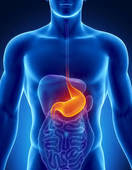DIGESTION
Matthew 15:17
Viewing the 1769 King James Version. Click to switch to 1611 King James Version of Matthew 15:17
Do not ye yet understand, that whatsoever entereth in at the mouth goeth into the belly, and is cast out into the draught?
Digestion is the mechanical and chemical breakdown of food into smaller components that are more easily absorbed into a blood stream, for instance. Digestion is a form of catabolism: a breakdown of large food molecules to smaller ones.
When food enters the mouth, its digestion starts by the action of mastication, a form of mechanical digestion, and the contact of saliva. Saliva, which is secreted by the salivary glands, containssalivary amylase, an enzyme which starts the digestion of starch in the food. After undergoing mastication and starch digestion, the food will now be in the form of a small, round mass, called a Bolus (digestion). It will then travel down the esophagus and into the stomach by the action of peristalsis. Gastric juice in the stomach starts protein digestion. Gastric juice mainly contains hydrochloric acidand pepsin. As these two chemicals may damage the stomach wall, mucus is secreted by the stomach, providing a slimy layer that acts as a shield against the damaging effects of the chemicals. At the same time protein digestion is occurring, mechanical mixing occurs by peristalsis, which are waves of muscular contractions that move along the stomach wall. This allows the mass of food to further mix with the digestive enzymes. After some time (typically an hour or two in humans, 4–6 hours in dogs, somewhat shorter duration in house cats), the resulting thick liquid is called chyme. When the pyloric sphincter valve opens, chyme enters the duodenum where it mixes with digestive enzymes from the pancreas, and then passes through the small intestine in which digestion continues. When the chyme is fully digested, it is absorbed into the blood. 95% of absorption of nutrients occurs in the small intestine. Water and minerals are reabsorbed back into the blood in thecolon (large intestine). Some vitamins such as biotin and vitamin K (K2MK7) produced by bacteria in the colon are also absorbed into the blood in the colon.[1]. Waste material is eliminated duringdefecation.



Comments
Post a Comment